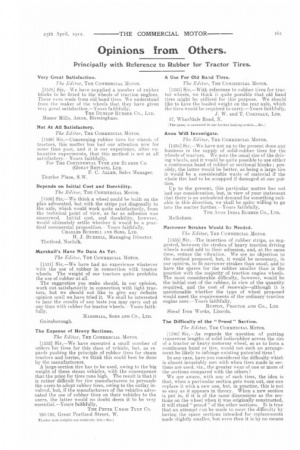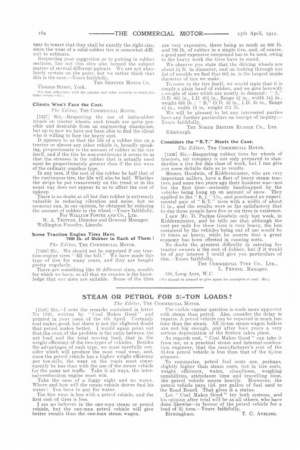Opinions from Others.
Page 17

Page 18

If you've noticed an error in this article please click here to report it so we can fix it.
Principally with Reference to Rubber for Tractor
Very Great Satisfaction.
The Editor, THE COMMERCIAL MOTOR
[13‘.2S] Sir,-We have supplied a number of rubber blocks to be fitted to the wheels of traction engines, These were made from old band tires. We understand from the maker of the wheels that they have given very great satisfaction.—Yours faithfully, THE DUNLOP RUBBER CO., LTD. Manor Mills, Aston, Birminglia,m.
Not At All Satisfactory.
The Editor, THE. COMMERCIAL MOTOR.
[1529] Sir,—Concerning rubber tires for wheels of tractors, this matter has had our attention now for some time past, and it is our experience, after exhaustive experiments, that this method is not at all satisfactory.—Yours faithfully, For THE CONTINENTAL TYRE AND RUBBER CO. (GREAT BRITAIN), LTD.
F. C. ALLEN, Sales Manager.
Thurloe Place, S.W.
Depends on Initial Cost and Durability.
The Editor, THE COMMERCIAL MOTOR.
[1530] Sir,—We think a wheel could be built on the plan advocated, but with the strips put diagonally to the axle, which would work quite satisfactorily, from the technical point of view, as far as adhesion was concerned. Initial cost, and durability, however, would ultimately settle whether it would be a practical commercial proposition—Tours faithfully, CHARLES BURRELL AND SONS, LTD.
H. J. BURRELL, Managing Director. Thetford, Norfolk.
Marshall's Have No Data As Yet.
The Editor, THE COMMERCIAL MOTOR.
[1531] Sir,—We have had no experience whatever with the use of rubber in connection with tractor wheels. The weight of our tractors quite prohibits the use of rubber at all.
The suggestion you make should, in our opinion, work out satisfactorily in connection with light tractors, but we should not like to give any definite opinion until we have tried it. We shall be interested to hear the results of any tests you may carry out at any time with rubber for tractor wheels.--Yours faithfully, MARSHALL, SONS AND CO., LTD. Gainshorough, The Expense of Heavy Sections.
The Editor, THE COMMERCIAL MOTOR.
[1532] Sir,—We have executed a small number of orders for tires for this class of vehicle, but, as regards pushing the principle of rubber tires for steam tractors and lorries, we think this could bestbe done by the manufacturers. A large-section tire has to be used, owing to the big weight, of these steam vehicles, with the consequence that the price for tires runs high. The result is that it is rather difficult for tire manufacturers to persuade the users to adopt rubber tires, owing to the outlay involved, but, if the manufacturers of the vehicles advocated the use of rubber tires on their vehicles to the users, the latter would no doubt deem it to be very essential.—Yours faithfully, THE PETER ENION TYRE CO. 190-192, Great Portland Street, W.
Tr Actor aale•weights are re1ative4 low.—End
A Use For Old Band Tires.
The Editor, THE COMMERCIAL MOTOR.
[1533] Sir,—With reference to rubber tires for tractor wheels, we think it quite possible that old band tires might be utilized for this purpose. We should like to have the loaded weight on the rear axle, which the tires would be required to carry.—Yours faithfully,
J. W. and T. CONNOLLY, LTD,
57, Wharfdale Road, N.
I The query is iinswerod in our Farther leading artiolo_En.] Avon Will Investigate.
The Editor, THE COMMERCIAL MOTOR.
[1534] Sir,--We have not up to the present done any business in the supply of solid-rubber tires for the wheels of tractors. We note the usual size of the driving wheels, and it would he quite possible to use either a continuous band of rubber or sectional blocks ; possibly, the latter would be better, as being a large tire it would be a considerable waste of material if the whole tire had to be scrapped if damaged at one portion.
Up to the present, this particular matter has not had our consideration, but, in view of your statement that there is an undoubted demand for something suitable in this direction, we shall be quite willing to go into the matter further.—Yours faithfully,
THE AVON INDIA RUBBER CO., LTD. Melksham.
Narrower Strakes Would Be Needed.
The Editor, THE COMMERCIAL MOTOR.
[1535] Sir,--The insertion of rubber strips, as sug gested, between the strakes of heavy traction driving wheels would add to their adhesion, and, at the same time, reduce the vibration. We see no objection to the method proposed, but, it would be necessary, in our opinion, to fit narrower strakes than usual, and to have the spaces for the rubber smaller than is the practice with the majority of traction engine wheels. The most considerable difficulty, however, would be the initial cost of the rubber, in view of the quantity required, and the cost of renewals—although it is questionable whether the type of wheel proposed would meet the requirements of the ordinary traction engine user.—Yours faithfully, RUSTON, PROCTOR AND CO., LTD. Sheaf Iron Works, Lincoln.
The Difficulty of the "Proud " Section.
The Editor, THE COMMERCIAL MOTOR.
[1.536] Sir,—As regards the question of putting transverse lengths of solid indiarulaber across the rim of a tractor or heavy-motorcar wheel, so as to form a continuous band or tire, would not such an arrangement be likely to infringe existing patented tires ?
In any case, have you considered the difficulty which is almost invariably met with when tires made in sections are used, viz., the greater wear of one or more of the sections compared with the others?
We are aware, with any of such tires, the idea is that, when a particular section gets worn out, one can replace it with a new one, but, in practice, this is not so easy as it appears in theory. When a new section is put in, if it is of the same dimensions as the sections on the wheel when it was originally constructed, it will stand " proud " of the other sections. It is true that an attempt can be made to meet the difficulty by having the spare sections intended for replacements "made slightly smaller, but even then it is by no means easy to insure that they shall be exactly the right size, since the wear of a solid-rubber tire is somewhat difficult to estimate.
Respecting your suggestion as to putting in rubber sections, has not this idea also formed the subject matter of several different patents We are not absolutely certain on the point, but we rather think that this is the case.—Yours faithfully, THE SHELTER MOTOR CO.
Thomas Street, York.
I We deal editorially with the patents and other subjevta to which this letter refen.—Eoj Clients Won't Face the Cost.
The Editor, THE COMMERCIAL MOTOR.
[1537] Sir,—Respecting the use of indiarubber treads on tractor wheels, such treads are quite possible and desirable from an engineering standpoint, but. up to now we have not been able to find the client who is willing to face the heavy cost. It appears to us that the life of a rubber tire on a tractor or almost any other vehicle is, broadly speaking, proportionate to the amount of rubber in the tire itself, a.nd if the tire be non-continuous it seems to us that the stresses in the rubber that is actually used must be proportionately greater than if the tire were of the ordinary omnibus type.
In any case, if the cost of the rubber be half that of the continuous tire, the life will also be half. Whether the strips be put transversely on the tread or in the usual way does not appear to us to affect the cost of upkeep.
There is no doubt at all but that rubber is extremely valuable in reducing vibration and noise, but no economy can, in our opinion, be obtained by reducing the amount of rubber in the wheel.—Yours faithfully, W. A. TRITTON, Director and General Manager. Wellington Foundry, Lincoln.
Some Traction Engine Tires Have 700 lb. of Rubber in Each of Them !
[1538] Sir,-We should not be surprised if our traction-engine tires " fill the bill." We have made this type of tire for many years, and they are bought pretty regularly. ,
There are something like 23 different sizes, moulds for which we have, HO all that we sentare is the knowledge that our sizes are suitable. Some of the tires
The Editor, TEE COMMERCIAL MOTOR.
are very expensive, there being as much as 600 lb. and 700 lb. of rubber in a single tire, and, of course, a good and expensive compound has to be used, owing to the heavy work the tires have to stand.
We observe you state that the driving wheels are about 5i ft. in diameter, and on looking through our list of moulds we find that 60i in, is the largest inside diameter of tire we make.
To come to the tire itself, we would state that it is simply a plain band of rubber, and we give herewith a couple of sizes which are mostly in demand : " A," O.D. 69 in., I.D. 601 in., flange 4g in., width 14 in., weight 65.0 lb. ; " B," 0.11. 42 in., I.D. 33 in., flange 4.4; in., width 12 in, weight 315 lb.
We will be pleased to let any interested parties have any further particulars on receipt of inquiry.— You r s faithfully, THE NORTH BRITISH RUBBER CO., LTD. Edinburgh.
Considers the " K.T." Meets the Case.
The Editor, THE COMMERCIAL MOTOR.
[1539] Sir,—Respecting rubber tires for wheels of tractors, my company is not only prepared to standardize a tire for this class of work, but I can give you some definite data as to results.
Messrs. Goodwin, of Kidderminster, who are very important millers, have a fleet of heavy steam tractors, and some two years ago their business was—not for the first time—seriously handicapped by the vehicles being hung up on account of snow. They applied to the " K.I." Co., and purchased an experimental pair of " K.T." tires with a width of about 11 in., and the results were so far satisfactory that to-day these people have five or six tires in existence.
I saw Mr. D. Parkes Goodwin only last week, in Kidderminster, and he tells me that although the cost per mile for these tires is very heavy, the loss sustained by the vehicles being out of use would be 10 times as heavy, while he asserts that a great economy has been effected in running costs.
No doubt the greatest difficulty in catering for tractor owners is the cost of iiiibber, but if it would be of any interest I could give you particulars of this.--Yours faithfully, THE COMMERCIAL TYRE CO., LTD-, L. FENNER, Manager.
138, Long Acre, W. C.
[We should be pleased to give space for examples of cost.-En.]
For WILLIAM FOSTER AND CO., LTD.




















